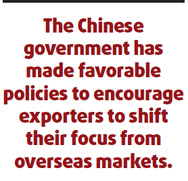

At a sales booth in a special trade fair in southern China, Zhou complained of how hard it was to sell her products.
"We sell them at factory-gate prices, but buyers still bargain. That makes me mad," said Zhou, a Taiwanese senior manager of Poly Dragon Industrial, which is based in the booming city of Dongguan that neighbors Guangzhou, capital of Guangdong province.
The trade fair she attended was co-organized by Guangdong and Hong Kong-listed e-commerce giant Alibaba.com. The recent two-day event aimed to help small Chinese exporters tap the domestic market amid weak overseas demand.
Organizers said the fair was attended by 400 small- and medium-sized export firms from Guangdong that displayed their company profiles at Alibaba's business-to-business division, and up to 30,000 big online sellers at taobao.com, China's largest consumer-to-consumer auction site, which is owned by Alibaba.
Zhou's company, owned by a Taiwanese, produces high-end lighting and photo frames. More than 95 percent of its products are for export.
The financial crisis and global slump in demand for made-in-China products have taken a toll on tens of thousands of exporters in Guangdong, which produced more than a quarter of China's foreign trade last year.
In the first four months this year, Guangdong exported $98.5 billion worth of goods, down 17.8 percent year on year. Its exports continued the decline for the sixth consecutive month, a downturn that began in November last year. Nationally, exports in the first four months totaled $337.42 billion, down 20.5 percent.
Poly Dragon, though keeping its workforce of nearly 300 relatively stable, lost up to 20 percent of overseas orders. In response, it eyed the huge mainland market and began to display the company profile in Chinese at Alibaba to attract domestic buyers. In the past, it only provided an English profile at Alibaba for overseas importers, Zhou said.
The road home, however, has not been easy. Besides cut-throat competition and a price war, she had to redesign many products that had been exported - which could feature Greek and Roman gods, or angels and other religious figures from the West.

The products were not popular among Chinese customers, particularly those in southern China, because they are unfamiliar with these gods and figures, she said, noting the company would replace them with a Buddha or bodhisattva, or maybe statues of women.
In addition, selling products at home needs good marketing, which Zhou said was very complex. "I have not learned how to sell in the domestic market," she admitted.
Zhou said her company would continue to make use of Alibaba and capitalize on China's booming online shopping in its effort to develop a domestic market. "China's market is so huge and we won't skip it."
China, with a population of more than 1.3 billion, is the world's largest potential market for seemingly everything from electronics to cars and all else.
The Chinese government has made favorable policies to encourage exporters to shift their focus from overseas markets. So Zhou's company was by no means alone. But as many once-thriving Chinese exporters entered the domestic market, they found themselves traveling a bumpy road.
Wang Dongping, general manager of Guangdong Top Umbrella, said he just couldn't strike the right note in domestic sales. Among the many problems were a totally different business model, no sales channel and inability to design products suitable for the Chinese market, he said.
Top Umbrella earlier sold more than $1 million worth of umbrellas, 90 percent of them for export. It had been manufacturing umbrellas for Western companies such as Disney, Kaloo, Happy Rain and Coca-Cola.
Wang said he had good expectations for the domestic market and taking it on was not a makeshift business strategy.
"I am planning to organize my own sales team. And I hope that domestic sales could account for up to 30 percent of my company's annual output in the next two or three years," he said.
Poly Dragon and Top Umbrella, both small-sized enterprises, were trying to expand their domestic sales through e-commerce. And they won a promise from Alibaba of more help.
Wei Zhe, CEO of Alibaba's B2B division, has promised that Alibaba would help China's small- and medium-sized enterprises as much as possible. "In the first quarter this year, our profit was 50 million yuan less than the same period last year. But we gave assistance to some 50,000 SMEs, cutting service fees by 1,000 yuan for them. And we will continue doing so," he said.
According to Wei, Chinese exporters were facing at least four hurdles on their road to tap potential at home - raising design capability, finding a sales channel, setting up an after-sales service network and building their own brands.
Many Chinese exporting firms used to manufacture through an OEM (original equipment manufacturer) arrangement with overseas brands and make products based on their designs. Once the products were shipped, their task was over.
Alibaba aimed to give SMEs a coat to pull through the economic winter, he said, claiming that the survival rate of SMEs that have used e-commerce methods was four times higher than that of others.
Xinhua
(China Daily 06/08/2009 page10)













